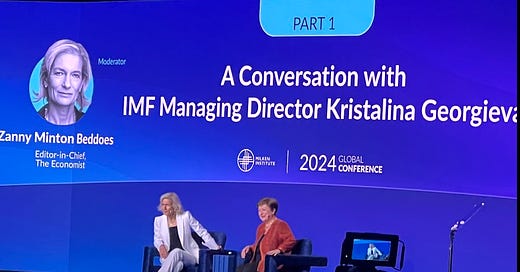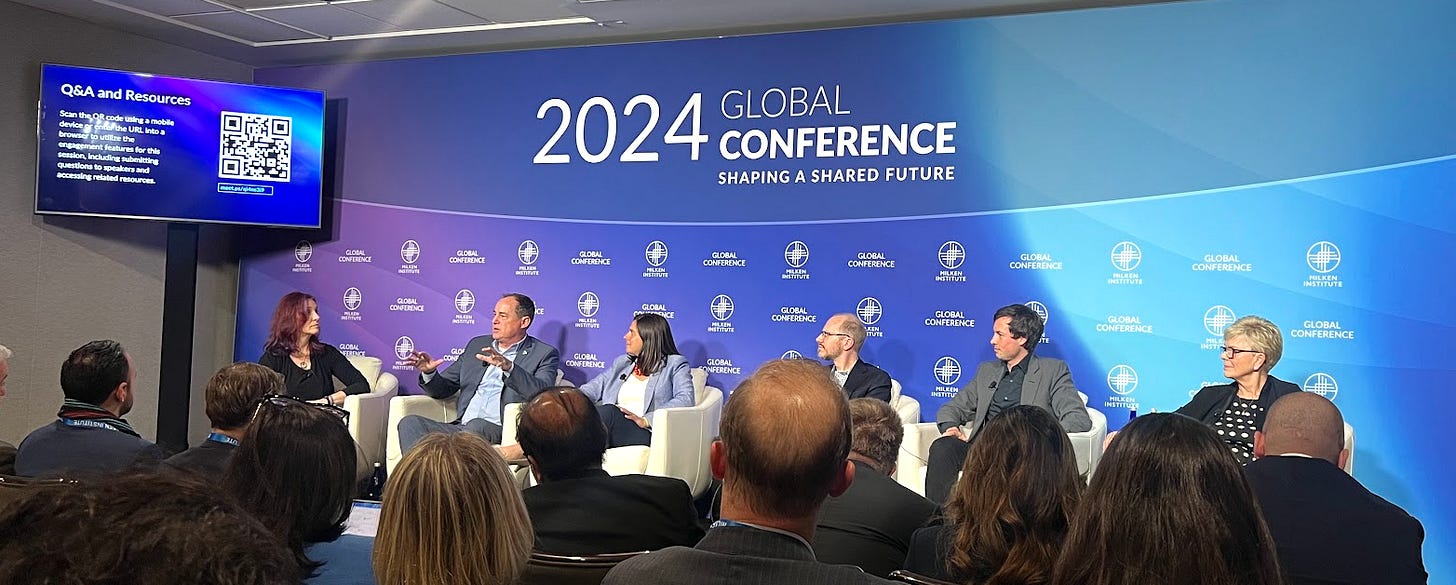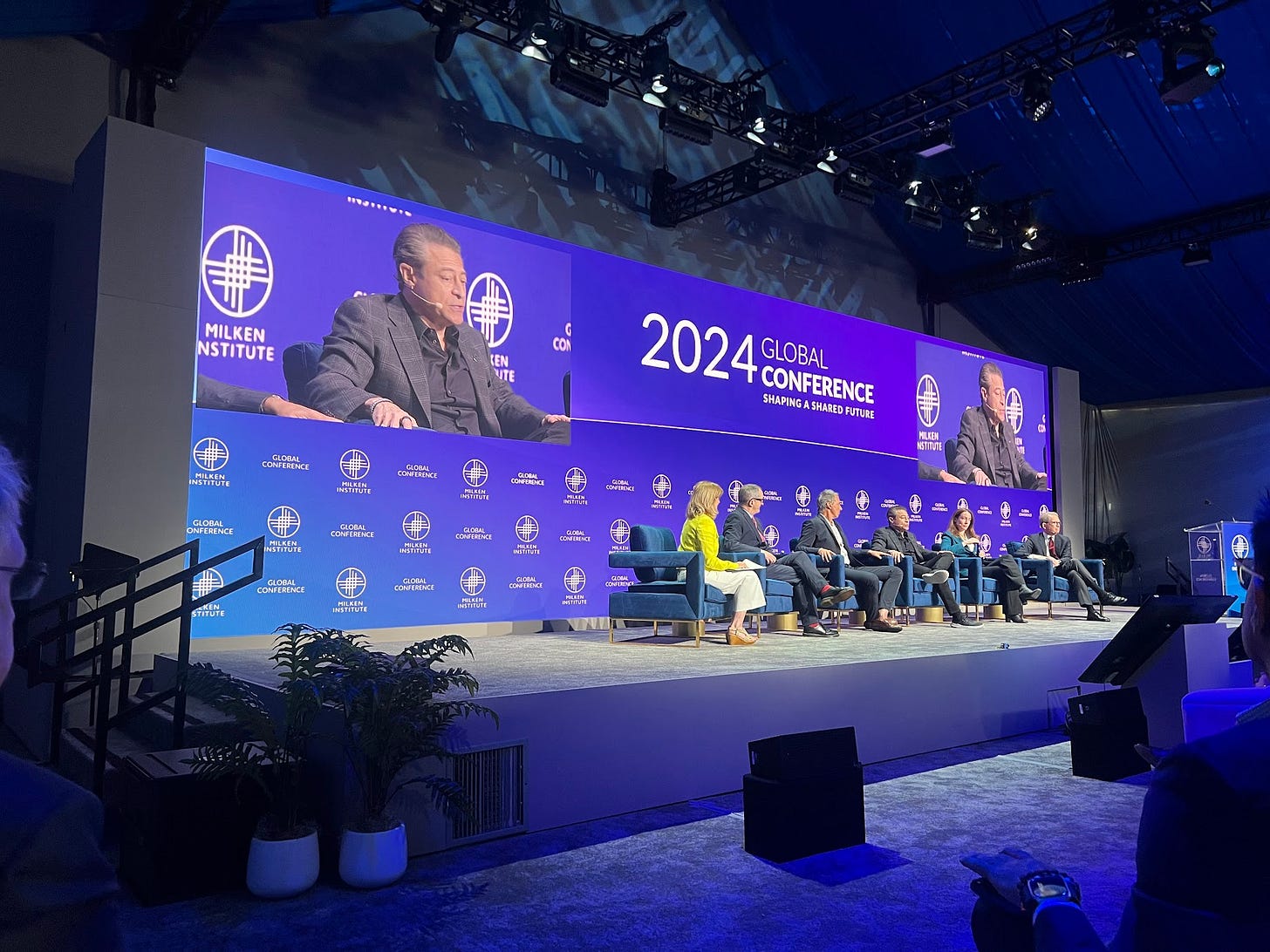Decoding Tomorrow: 10 Hopeful Takeaways from the Milken Conference
A decade of transformation ahead
The Milken Institute Global Conference is a realm where key global sectors intersect. Usually reserved for a select few, these discussions offer profound insights into the forces shaping our world, and many of the conversations are now available digitally! Here are ten things that loop in my mind and give me hope :).
#1. Economic Insights: A Breath of Relief During a conversation with IMF Managing Director Kristalina Georgieva at the Milken Conference, I found a sense of relief regarding the long-term economic strength of the United States. Her insights provided a comforting perspective that eased my concerns about financial constraints
.Watch the full discussion here.
"The US is very innovative as an economy. Ideas turn into businesses, and then these businesses scale up. The U.S. also has a remarkably strong labor market." Kristalina Georgieva, IMF Managing Director
The U.S. is a magnet for capital: Post-pandemic, the U.S. has seen a significant increase in financial inflows, capturing one-third of all global monetary movements, up from 18% prior to the pandemic. This makes the U.S. a major hub for global capital, reflecting its economic stability and attractiveness.
Dominant dollar and speedy recovery: The U.S. dollar continues to be the cornerstone of the global economy, instilling trust in the U.S. financial system. Coupled with a rapid economic recovery and consistent GDP growth outpacing its peers, the U.S. sets a global standard for economic resilience. Innovations like the digitized stablecoin dollar, USDC, spearheaded by companies like Circle, could further solidify this position.
Energy and AI demand: As a major energy exporter and a leader in AI innovation, the U.S. is strategically positioned to meet the burgeoning energy demands driven by AI's rapid growth. This sector requires substantial energy for computational processes, and the U.S.'s robust energy production capabilities ensure it can sustain these demands.
#2. The three ‘Ts’ of future economic scenarios: The 2020s may unfold into one of three distinct paths, according to Kristalina Georgieva.
The Turbulent '20s could be marked by instability, geopolitical tensions, and economic volatility.
The Tepid '20s might see subdued growth and moderate technological advancements.
The Transformational '20s could be driven by breakthroughs in AI, green energy, and biotechnology, alongside significant policy reforms, potentially ushering in a new era of prosperity and inclusive growth.
#3. Cybersecurity is a losing game without new design principles With cybercrime costs projected to hit $10 trillion, addressing cybersecurity requires more than reactionary measures. CISA, the U.S. Cybersecurity and Infrastructure Security Agency, has introduced the Secure by Design Pledge. This initiative encourages companies to voluntarily commit to integrating security features from the outset of software and service development, aligning with CISA’s Secure by Design principles. These principles advocate for making customer security a fundamental aspect of business strategy, not merely an added technical feature. By incorporating these security measures during the design phase, companies can significantly reduce the number of vulnerabilities in their products before they reach the market. Additionally, some companies are now linking executive compensation to security outcomes, ensuring that top leaders prioritize cybersecurity commensurate with the risks it presents.
#4. Philanthropy gains steam! Global philanthropy has reached nearly $500 billion, highlighting a significant scale of generosity that often goes unnoticed.
"So while agrimony may get more than the headlines, extraordinary generosity is also unfolding, even if it's not getting the same attention." Richard Ditizio, Milken Institute CEO
#5.Finally, we are sharing! A major theme is the shift toward interdisciplinary collaboration, where scientific and medical communities worldwide are pooling data and resources across borders. This trend is exemplified by initiatives like the Global Alliance for Genomics and Health, which aims to enable the sharing of genomic and clinical data internationally. This approach is crucial for tackling complex global challenges such as pandemics, climate change, and chronic diseases, as it combines diverse expertise and large datasets to accelerate innovation and discovery.
"So the genome is an entire recipe book that 's equivalent to 1000 copies of War and Peace, which if you pile them one on top of the other is a nine-story building, huge amount of information."
#6. We are entering the ‘Springtime’ of medical innovation: We are witnessing a "springtime" in the lifecycle of groundbreaking medical technologies such as cell therapy, gene therapy, and mRNA vaccines. This phase is marked by vibrant growth and enormous potential. These innovative treatments, once confined to theoretical research, are now moving into practical applications, revolutionizing the way we tackle complex, previously untreatable diseases.
Gene therapies are beginning to correct genetic disorders, while mRNA vaccines, initially developed for COVID-19, are being explored for their potential in treating cancer and autoimmune diseases. Similarly, CAR-T cell therapies, which were primarily used for treating blood cancers, are now expanding to other types of cancer, fueled by substantial investments from both public and private sectors.
"Things like cell therapy, gene therapy, all of these are really in their springtime of their lifecycles."- Reed Jobs, venture capitalist and founder of Yosemite
#7. Serendipitous breakthroughs: Efforts to tackle plastic pollution unexpectedly led to advanced cancer research and drug discovery, showcasing the potential of focused initiatives to yield surprising breakthroughs across disciplines. With the advancement of collaboration and AI, we are poised to uncover even more serendipitous discoveries, addressing complex global challenges. Maintaining an open and curious mindset can enhance our capacity to connect seemingly unrelated fields, unleashing solutions far beyond their original intent.
"We wanted to clean 95% of plastics, and on the way, we discovered new genotypes for cancer and drug discovery."
#8. Breezing by 100-year-old birthday parties?: Dr. Peter Diamandis introduced a new XPrize initiative focused on reversing age-related functional declines in muscle, immune system, and cognitive health by at least 10 years, aiming for 20 years. The competition, which has attracted 300 teams, aims to stimulate innovation in longevity science by offering $141 million in funding, including a $111 million prize pool. This substantial financial commitment underscores the initiative's goal of achieving longevity escape velocity by encouraging groundbreaking advancements in healthspan extension.
"This decade that we're getting the tools to understand how to address the software and the hardware problem." Dr. Peter Diamandis, founder of XPrize and CEO of the Zero Gravity Corporation
#9. Reengineering unconscious habits via our environments
Dan Buettner’s Blue Zones Insights on engineering environments to influence unconscious health choices have inspired a shift in urban planning, emphasizing pedestrian-friendly infrastructure and accessible local food sources to promote physical activity and healthier eating. These intentional design strategies don’t rely on willpower; instead, they foster community interaction and mental well-being, making healthy living the most accessible and natural choice for residents.
"We simply change their environment to engineer their unconscious choices." - Dan Buettner, author Blue Zones
#10. Menopause is finally on the table! The menopause revolution is flipping the script on women's health, ditching the outdated notion of one-size-fits-all treatments. With personalized medicine leading the charge, women are reclaiming control over their bodies during this transformative phase. From hormone replacement therapy (HRT) to cutting-edge AI diagnostics, the era of menopause is being redefined as a time of empowerment, not resignation, challenging traditional healthcare norms and sparking a much-needed conversation about women's unique healthcare needs.
“These gaps in care that have been overlooked for so long are what get deals exciting because we know there's pent-up demand for this. The menopause company we invested in just two years ago had astronomical growth; they just raised $16 million, doing it in a down market because of all the pent-up demand. There are no solutions out there. There's going to be a billion women undergoing menopause. By next year, 10,000 women are turning 65 every day.” - Maria TolerFounding and Managing Partner, SteelSky Ventures
As you look through the fraction of the insights shared this week, it’s clear that we stand at the cusp of hope-inducing transformative changes. These developments promise significant advancements despite prevailing uncertainty and challenges. As emphasized in Part 1 of our Milken coverage, there's a critical need for and benefit to maintaining optimism. Moreover, our motivation to steer the future towards betterment should be fueled by the aspirations we hold for future generations. Take, for example, my five-year-old son—pictured here—who, like all children, pets, and people, deserves to inherit a world brimming with prosperity, groundbreaking innovations, and a community of collaborative problem-solvers. Let’s be that for them!
Curiosity is contagious; if you like this newsletter, please share it!!
Penned by Libby Rodney and Abbey Lunney, founders of the Thought Leadership Group at The Harris Poll. To learn more about the Thought Leadership Practice, just contact one of us or find out more here.











